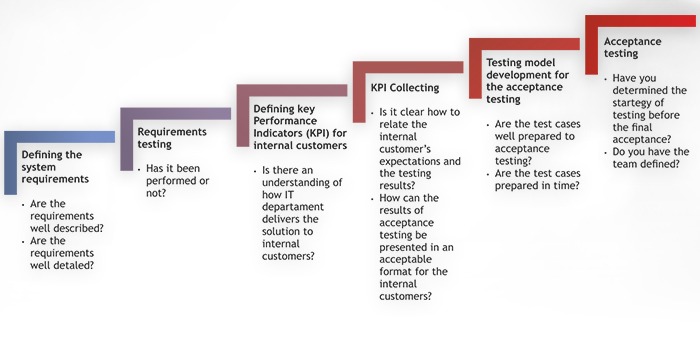
Start testing your billing product a year in advance
There are a wide variety of billing providers, and choosing one for a particular project can be a complex process. No matter which provider you choose, the most difficult step is actually implementing a new billing solution once it is complete.
Billing-solutions development companies started offering full-circle business solutions some time ago. However, this doesn’t spare telecom companies from turning to specialized customization and quality assurance consulting to fine-tune a billing solution and make it meet their particular needs.
When a telecommunications company starts a large-scale solutions implementation, such as an OSS/BSS replacement, the cost of failure is enormous. After all, such an undertaking involves the risk of not only sticking to the budget and meeting important deadlines, but also keeping customer loyalty intact.
A telecom company’s expectations when undertaking such a project include:
- ensuring it receives a quality product;
- getting implementation done as soon as possible; and
- realizing an advantage in the commercial marketplace by implementing a new solution and offering new services ahead of its competitors.
The process of implementing a billing solution is complex, and may be the largest project that a telecom company can undertake. The scope and scale require a mutual effort and cooperation amongst the company’s management (so-called internal customers from various business units), IT department, and billing solutions integrator (perhaps more than one integrator). Everyone must work together to build and launch a new billing system.
Our experience in similar projects has shown that to guarantee a successful (and on-time) launch, testing needs to be effectively included not just during the implementation process, but it must be a fundamental part of the entire project.
It is important to pay attention to the potential difficulties that may arise at the acceptance stage of such projects:
1. Acceptance testing may take longer than expected.
- Deadlines can be missed.
- When the project is drawn out, the budget goes up.
2. Acceptance testing may fail, which means one or problems must be fixed, and testing must be repeated.
- The launch of the new billing system must be postponed.
- Another round of testing means freezing marketing initiatives indefinitely.
- Staff must be retrained to operate the system.
- Staff must be retrained for the rollout phase.
To reduce these risks at the initial stage of the project implementation, you should ensure well ahead of time that:
- You have determined how internal customers will accept the system.
- You have prepared and delivered an acceptance testing process.
- You have determined who will perform acceptance testing.
The main stages that can impact the performance of acceptance tests are:

Expert advice
- During the planning stage of the project, define the timing of the acceptance testing phase, as well as the criteria for its start and end. In some cases, we recommend you schedule pre-testing before acceptance testing to improve the quality of the solution, and reduce the risk of unsuccessful acceptance testing.
- When defining system requirements, carefully check all the details of the new system’s requirements, and make sure they are all well thought out and necessary. It is important to go to extreme detail here. Otherwise, this work ends up being performed at the testing stage, when the solution has already been developed by the integrator.
- Before testing, define main testing KPIs. Begin with your internal customers’ business expectations and prepare clear business criteria.
- Connect the KPI for the business to the test results. The test results must be associated with the calculation of KPI. If this aspect of the test results is neglected, the results may be misinterpreted for internal customers, and this can complicate the final decision on the system.
- The time it takes to prepare for testing may take as much or more time as the actual acceptance testing. The quality of the system requirements developed earlier can greatly affect how difficult and how long this preparation phase can take.
Conclusion
Our company’s experience with implementation projects supports the methodology proposed in this paper. After performing so many of them, we came to this conclusion: For an acceptance test to be successful and timely, and lead to the launch of high-quality solution, the test team should begin work far in advance and go through several stages of planning and preparation before the actual testing begins.
When you consider that the first phase should begin when requirements are prepared, it is likely that the team will start their initial tests a year before the acceptance tests themselves. This early start will help pre-empt many of the potential risks and problems involved in such a complex project, and help reduce the severity of others.









